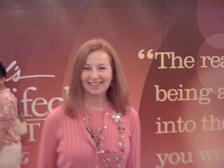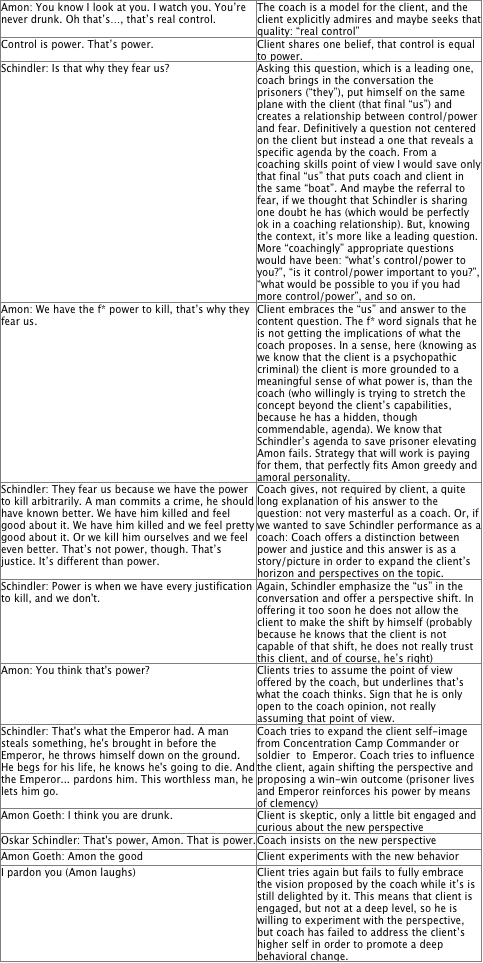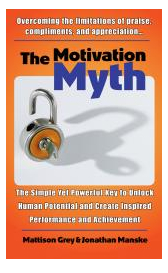
Yup, that's how much an influence she's been on my life. I first got fired up to become a coach, while watching Oprah do a series with Life Coach, Cheryl Richardson, twelve years ago. Now I'm training other folks who are equally fired up, to become coaches, themselves. Thank you, Oprah!
Last Monday, I saw Oprah live at the premiere of her Lifeclass Tour. You might wonder why I waited 'til now to go see Oprah live. All I can say is, I won the ticket lottery for the world premiere of her Lifeclass Tour here in St. Louis and boy was I excited! Here's what I took away from this amazing adventure...
LESSON 1: Know When to Break the Rules. Moments before leaving my house in Washington County, I called my friend, Career Coach, Joanne Waldman, PCC, for some last-minute directions to her house, more than an hour away. Joanne, who was accompanying me to Lifeclass, mentioned that the rules said we were supposed to bring small handbags, not gigant-o bags, like the one I was planning to bring (Oprah likes her audience to look great on camera, so wear bright colors and keep your little bag under your seat).
No problem! I have a huge collection of cute little bags and I quickly found one just big enough for my wallet and cell phone. I got to Joanne's house right on time, despite some crazy road construction and it was an absolutely gorgeous day. We were psyched to be seeing Oprah in just two more hours and were about to get some lunch on the way when...
Holy Crap! I left our Lifeclass tickets in my big bag at home! (That's life with ADD.) If only...oh God! But it was too late. No tickets, no admission. I called the theater. No dice...
LESSON 2: Set Your Intentions and Act Like Your Hair's On Fire. I called my sister, Becky, and asked her to bring my big bag with the tix and meet us halfway. It was crazy. There was no way we'd get there before the theater closed its doors for the taping, but we went for it.
God bless Becky, she drives like a 5-Alarm Fire Chief even when there's no rush. She met us with the tix. I handed them to Joanne for good keeping and took off to make the hour-and-a-half drive with only an hour and ten minutes left 'til doors closed. Like good coaches, Joanne and I visualized walking through those theater doors with big smiles on our faces and handing our tickets to the ushers. And we made it. With fifteen minutes to spare!  (Okay, there was some speeding involved.)
(Okay, there was some speeding involved.)
My friend, Career Coach, Joanne Waldman, PCC, in-line with a big smile on her face, just before walking through the front doors of the Peabody Opera House for Oprah's Lifeclass, feeling really relieved to be there on time (and in one piece). =====>
And you guessed it! Half the audience was carrying gigant-o handbags (see above pic) and nobody cared. So respect your limitations (mine is distractability) and adjust the rules to fit you. And if you screw up (which you will), set strong intentions and act on them like your hair's on fire.

<===== Here's me in the lobby, just before the ushers threw us out, insisting we get to our seats. Yeah, we broke their rule to 'keep moving', so we could nab a couple of pics. After all, we were feeling pretty special for getting there faster than humanly possible.
LESSON 3: Take a Chance on the Unknown. I had the option to enter the lottery for 4 different Lifeclass tapings, each with a different guest. Two were Deepak Chopra and Tony Robbins, heroes of mine. One for Iyanla Vanzant, who's great. And one for a guy I never heard of, Bishop T. D. Jakes. I really just wanted to see Oprah, so I took a chance on the new guy and he was absolutely awesome. I won't even try to tell you what he said; you have to SEE him. The show airs Monday, April 9th, 8ET/7CT. Bishop Jakes is all about Finding Your Purpose.
LESSON 4: You're Here for a Reason. That was the key message of the show. You're here at this show for a reason (Joanne and I knew that. We were MEANT to be there, so we had to get there on time). Your life has a purpose and Oprah and Jakes taught us how to find it. Adversity doesn't stop you from achieving your purpose. In fact, Jakes' metaphor for purpose and adversity is an archer: If you're the arrow, and your life is the bow, then the farther the archer (adversity) pulls the arrow (you) back, the farther and stronger you'll go to reach your purpose (Joanne and I had just proven that on the way to the show).
LESSON 5: Your life is a class. I was already familiar with most of the lessons they taught that day. After all, I've been a life-long personal development junkie. Oprah and Jakes just have an incredibly intense and wonderful way of teaching it all. They connect to the audience more profoundly and reach more people, as a result. They are more animated (that's why you have to SEE them). They're more entertaining. After all, they are masters of television. They are stars. But aren't you are star, also? Oprah thinks so.
LESSON 6: It's what happens off-the-record that really inspires. At the end of the show, as we were about to leave our seats, Oprah came back out, not for the television cameras, but just for us. She talked about how her purpose was to use television to help people have better lives. That she was always asking God to use her. And she had focused on how to use the Oprah show to serve her purpose, not have the show use her. And that's her big vision for OWN TV. That she has made mistakes with the network and was digging out of a hole (the papers say she just laid off 20% of her staff). She asked for our help to spread the word, so our culture has at least one television channel that uplifts, instead of just pandering to our lowest common interests.
It was her candidness and vulnerability that spoke most clearly. Here is the biggest star in the world (according to one poll), a profoundly spiritual being who just happens to be a billionaire in kickass diamond earrings. It seems like she has the Midas Touch, but even she can make mistakes...
Hmmm, could it be that adversity will help her arrow soar even farther and stronger?
Yep, that little speck center stage is Oprah, from my iPhone in row Z of the orchestra. That's okay, I saw her with my own eyes and heard her message with my own ears. =====>
LESSON 7: Be a Servant Star. Oprah's Lifeclass made me realize that I'd lost track of my purpose, so I can't use School of Coaching Mastery to reach it. I started the school to help carry out Thomas Leonard's purpose to improve coaching worldwide with IAC coach certification. He infected me with his vision ten years ago, but then he passed away, the IAC changed, its certification has changed, the ICF has also changed. Now I'm mired in certification requirements...
School of Coaching Mastery has never really been about life coach certification. It's about the mastery coaches achieve on the way to coach certification. But what's the purpose of coaching mastery?
Coaching mastery is about helping people (coaching clients) learn the life lessons they need faster and more deeply, so they can create better lives and reach the highest, fullest expression of their beings. Period.
I've talked for years about the importance for coaches, of becoming Servant Entrepreneurs and I just had the honor of seeing the Ultimate Servant Entrepreneur.
Oprah is a Servant Star. Not because she's about being a star, it's because she's about revealing the star in you and asking you to use it to serve.
How inspiring is that?
In what ways might you already be a Servant Star? How do other Servant Stars light you up? How do you light people up? What do you need in order to use your life to serve your purpose? Do you know what your purpose is? How is adversity sending you even farther and stronger toward your purpose?
Are you ready to step up to Being a Star Who Serves? Please share your thoughts below...
Watch Oprah's Lifeclass Tour on Monday nights at 8PM ET/7PM CT. Watch two hours and call your life coach in the morning...







 Guest post by Jen Waller, Top Ten Winner of
Guest post by Jen Waller, Top Ten Winner of 











 (Okay, there was some speeding involved.)
(Okay, there was some speeding involved.)


